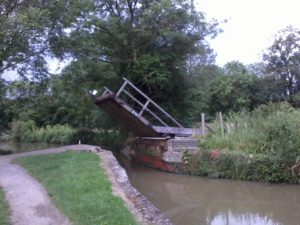My neighbour, a lovely young woman who used to rescue street dogs in Puerto Rico and who now studies chickens at the Oxford University zoology unit, knocked on my window Friday morning. Wrapped in a fluffy pink dressing gown, trailed by two of her elderly dogs, and grasping a greasy plastic bag, she signalled to me that she had some “unfortunate news”: apparently her cocker spaniel had raided the bow of my boat and carried off a duck, the remnants of my Thanksgiving celebrations.
The day I feel most foreign, most homesick, most alone is the fourth Thursday in November. For a few years, when I first lived in England, I celebrated faithfully with other expatriots. There was a little deli in the Oxford Covered Market where you could get Libby’s One Pie Pumpkin in a can and Aunt Jemima’s Cornbread Mix in a box, but only if you ordered in advance and paid an eye watering price. When the day came to pick up your goodies you stood in line while they carefully scanned their list and ticked your name off. If you got to the front of the queue, and confessed you hadn’t ordered, but really, really wanted pumpkin pie, you were properly scolded (as only the Brits can scold) and added to a waiting list. Sometimes you got the tin, and sometimes you didn’t.
Things got tougher when I moved out of the city and into a small southwest Oxfordshire village. The expatriot community had moved on; the grownups had jobs and the children had homework, and no one wanted a feast day on a Thursday. I shifted our family celebrations to the following Sunday, and murmured with discontent at the radio and television news that would not let me forget: “Wall Street was closed today for the Thanksgiving holiday”.
I skipped a few Thanksgivings. The Oxford deli closed down and my marriage was over. The kids were gone, except my youngest. Thursday was the Ex’s night and we weren’t friendly enough for me to ask for a swap, so I was on my own. I bought sushi-for-one as a special holiday treat and went to the gym.
When I came home, the cat had eaten the sushi.
That was the last time I didn’t celebrate properly. After that, I did what I should have done long before. I wrote a note to my child’s teacher to say she wouldn’t be doing homework that night. I took the same number of days off work as I would have if I had been in the US. I cooked up a storm, laid a table for 12 to 14, and finally raised a child who loves pumpkin pie.
But times and kids moved on again. I left the house in the village and gave the table that seats 14 to the Ex. He uses it to stack papers, a giant desk that only needs to be cleaned every 5 years or so, and I moved onto the boat.
I’ve celebrated three Thanksgivings on Pangolin. The tiny oven (14.5 x 12 inches) means I cook in shifts over several days, and though I did spatchcock a turkey one year on the barbeque, a duck works best indoors. My parties are smaller, too. I can just about manage two couples, plus me. This year the menu was duck, stuffing (with home baked bread), mashed potatoes, giblet gravy, Brussels sprouts with mushrooms and pancetta, and two kinds of cornbread, followed by pumpkin mousse with rum, cream and brown sugared almonds.
Someone asked if we shouldn’t say grace, and one of my guests and I responded with the Oxford blessing: Benedictus, benedicat. If you say it in Latin the religion counts, or doesn’t count, and no one is sure.
I do have a refrigerator on Pangolin, and I use it in the summer, when the solar panel runs it for nothing, but in the winter it seems profligate to run that indoor box when the outdoor world will do almost as much. I sent my guests home with as many leftovers as they would take, and I wrapped my duck carcass in foil and put it in the cratch (the covered bit of a narrowboat bow) along with a jug filled with the giblet gravy.
My neighbour opened her plastic bag and offered me the defiled bones, in case I wanted them for my own dog, but I declined. The jug of giblet gravy was licked almost clean, but the livers at the bottom escaped her dog’s tongue, so mine still had breakfast.
And with that, another Thanksgiving was over.







